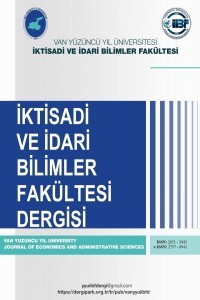HEDLEY BULL PERSPEKTİFİNDEN ULUSLARARASI TOPLUM KAVRAMSALLAŞTIRMASI VE KURUMLARI
Uluslararası ilişkiler (Uİ) yazınındaki İngiliz Okulu Kuramı, çoğulcu bakış açısına sahip teorik yapısı içerisinde uluslararası toplum kavramına vurgu yaparak bir uluslararası siyaset anlayışı geliştirmiştir. Uluslararası toplum kavramını, farklarını daha belirgin şekilde ortaya koyarak tanımlayan ve daha da somutlaştıran Hedley Bull, sadece İngiliz Okulunun kuramsal varsayımlarının yerleşmesini sağlamamış, aynı zamanda uluslararası ilişkileri incelerken kurum tartışmaları gibi yenilikçi bir tartışmaya da ilham vermiştir. Bu makale, Bullun (evrilmiş) kurumları ile uluslararası toplum kavramsallaştırmasının Uİyi anlama/açıklamada nasıl bir katkı sunduğunu analiz etmeyi amaçlamıştır. Çalışmada, uluslararası toplum kavramıyla birlikte, onu ayakta tuttuğu varsayılan güç dengesi, uluslararası hukuk, diplomasi, savaş ve büyük güçler yönetimi kurumları tartışılarak Bullun çizmiş olduğu genel çerçevenin, Uİ disiplinindeki kuramsal tartışmaların geliştirilmesi için sürdürülebilir bir zemin teşkil ettiği savunulmuştur.
Anahtar Kelimeler:
Hedley Bull, Uluslararası Toplum, İngiliz Okulu, Güç Dengesi, Kurumlar
HEDLEY BULL’S CONCEPTUALISATION OF ‘INTERNATIONAL SOCIETY’ AND ITS INSTITUTIONS
English School Theory of International Relations (IR) has developed an understanding of international politics with a great emphasis on the conception of ‘international society’ within the limits of its pluralist theoretical structure. Hedley Bull, as the leading scholar who has distinctively defined and boldly concretized the concept has not only consolidated the theoretical assumptions of the School but also inspired innovative discussions such as the “institution debate” for the examination of international relations. This article aims to analyse how Bull’s conception of international society along with its evolved ‘institutions’ have contributed into understanding/explaining IR. After having discussed Bull’s conception of ‘international society’ which assumes to be sustained by five institutionsbalance of power, international law, diplomacy, war, and the great power management, this paper argues that Bull’s framework is a candidate to be a sustainable ground for further theoretical discussions within the discipline of IR
Keywords:
Hedley Bull, International Society, English School,
- ISSN: 2651-3943
- Başlangıç: 2016
- Yayıncı: Van Yüzüncü Yıl Üniversitesi
Sayıdaki Diğer Makaleler
Yrd. Doç. Dr. Mehmet Murat TUNÇBİLEK, Adil AKKUŞ
BİREYSEL KARİYER PLANLAMASINDA ETKİLİ OLAN FAKTÖRLER: MUŞ ALPARSLAN ÜNİVERSİTESİ İİBF ÖRNEĞİ
Bilal DEMİR, Yrd. Doç. Dr. Abdurrahman ÇALIK
E-DEVLET ANLAYIŞI VE TÜRK KAMU YÖNETİMİNDE EDEVLET UYGULAMALARI
TÜRKİYEDE ÖDÜL ALMIŞ GENÇ SOSYAL GİRİŞİMCİLERİN PROFİLLERİ ÜZERİNE BİR ARAŞTIRMA
Prof. Dr. Esin CAN, Ayten CANBAL
HEDLEY BULL PERSPEKTİFİNDEN ULUSLARARASI TOPLUM KAVRAMSALLAŞTIRMASI VE KURUMLARI
HİZMET KALİTESİNDE YENİ BİR BOYUT: BİLGİLENDİRME
Yrd. Doç. Dr. Ertuğrul ÇAVDAR, Emrullah KIPÇAK, Erhan ÖNAL
AZERBAYCANIN BDTYE ÜYELİK SÜRECİNDE TEMEL DİNAMİKLER
NİETZSCHENİN AHLAK ELEŞTİRİLERİ BAĞLAMINDA MODERN ÖZNEYİ TAHAYYÜL ETMEK
